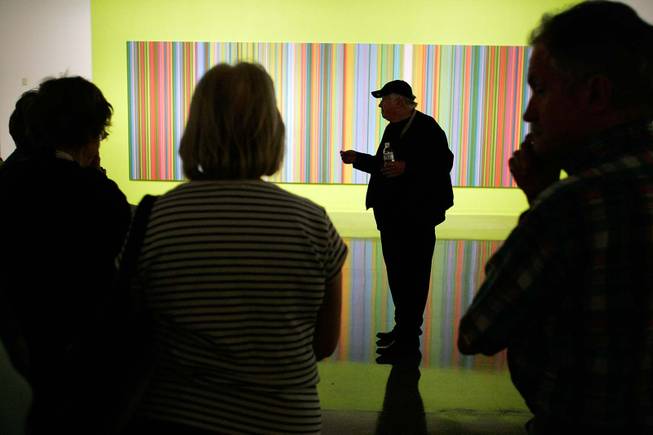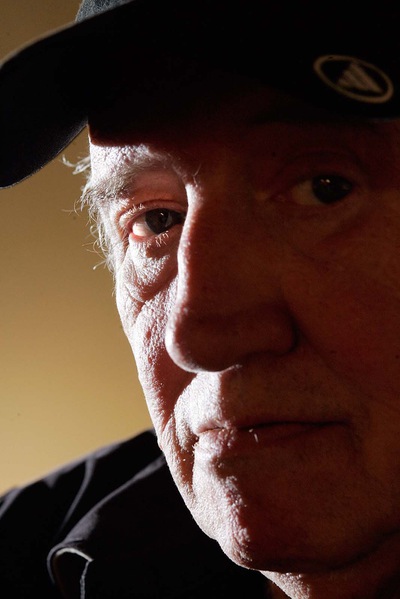
Leila Navidi / FILE
Dave Hickey’s 1993 book, which challenged the art-world establishment and its habit of telling people how to experience works of art, made him a bit of a pariah in the art community, but he developed a following and is back with a sequel, “The Invisible Dragon: Essays on Beauty, Revised and Expanded,” to be released in March.
Thursday, Jan. 29, 2009 | 2 a.m.
Dave Hickey is chain-smoking outside El Choncho Mexican restaurant. He’s talking about sex and academia, his new elliptical machine, politics, “The Real Housewives of Orange County,” the Allman Brothers and degrees of stupidity (my own included).
Occasionally we drift back to the point of the interview: his revolutionary and controversial book, “The Invisible Dragon: Four Essays on Beauty,” and its soon-to-be follow-up, “The Invisible Dragon: Essays on Beauty, Revised and Expanded” (to be released in March).
Things got a little nutty back in 1993 when Hickey, a revered international art critic (unafraid to wear a NASCAR jacket), published the little book that took on the academic and institutional minds that had been busy telling people how to look at, appreciate, buy and enjoy art.
What started with a random defense of beauty at a panel discussion turned into a scathing critique of the establishment.
Hickey was shunned, canned from the lecture circuit and attacked by theorists.
He took the book out of print a year later and now it’s back. He hasn’t changed his mind about anything. If anything, he goes into more detail.
Hickey, an English professor at UNLV and the husband of Libby Lumpkin, former executive director of the Las Vegas Art Museum, opens the book with a new essay, a charming and heartfelt little tale in third person about the debacle.
The book ends with an essay on beauty in society, the market and art history.
Much of the conversation outside El Choncho is not fit for print in a family newspaper, but we managed to salvage a few of his comments on “The Invisible Dragon.”
Did you take “Invisible Dragon” out of print because it was so controversial and because you felt a tad wounded?
I took it out of print because it was kind of nasty. Because I didn’t like being the beauty guy and because a lot of stupid flower-painters thought I was on their side.
What led to talking beauty?
Art in the ’80s was really about ugliness. It was about a kind of shocking ugliness and nothing in the art world stays shocking for very long. Art has become more and more vulgar trying to keep that nasty edge, but it can’t. Beauty was so unfashionable that it seemed to be the horse to ride. Also beauty is the one thing you don’t have a choice about. You don’t have a choice about remembering beautiful things. You’re going to remember them. The question is, who tells you what to like. Does some professor tell you what to like? Or do you look at it and decide you like it? How many people have come to me saying they’re interested in art and asking what they should read? If you’re interested in literature would you ask what painting to go see?
You had become such an outcast.
I was a bad boy.
You’ve since been praised.
Because I won.
How?
I wrote a book about beauty. Now, in the constellation of words out there, “beauty” blinks a little bit brighter. That’s the only change. The word means more than it did before. I discovered that my defense of beauty meant the most to kids. They need permissions. If they find one grown-up who says something they agree with, they are empowered. All these kids wanted was somebody to say, “Hey, it’s OK. You don’t have to believe all of this (stuff).”
The book has also validated my suspicion that postmodernism was pretty much an academic invention. Academics presumed that modernism was once all-powerful and now it was dead. Whoopee! Well, what does 9/11 prove? It proves that modernism is not a done deal. Half the world lives in a fundamentalist, medieval universe. So the whole idea of postmodernism has lost a lot of its allure now. It’s clear today that a few things about modernism ... are probably OK.
You say that you’re not as mean in this book?
Yeah. I finally discovered that you can’t impose your own ritzy standards on the whole world. America is a nation of C students and we like it that way. Being smart is not that much of an advantage in America. If you’re in Europe and you’re an A student, they really love you. In America, they don’t. It’s all set up for C students, and that’s fine, because smart people don’t need that much help. If you are smart, no credit to you, there is no way to understand what a person with 20 points less IQ than you have might be thinking. And they are in charge. So I try to stay out of the light.
Why revise it now?
I just wanted to lower the temperature of everything. I let “Invisible Dragon” go out of print after about a year and now they’re about $500 on the Internet. It’s a good book, but it’s not that good.
Also, I’m doing a book for Simon & Schuster of which this is kind of the introduction to, and it’s called “Pagan America,” and it’s about America as a pagan culture — like Rome, which basically has problems with superstitious cults like Christianity. America is a fairly secular place and all of these Jesus nuts keep trying to put “under God” in the Pledge of Allegiance.
So I’m just writing about pagan things in America that are part of American culture and the adversarial court system where it is presumed that there are two sides to a question ... The weird thing about being run by religions is that religions don’t play well with others. So much of America is about teaching people how to play well with each other.
One of the things Hugh Hefner did, aside from sexualizing the girl next door, is he made those girls people, he taught you to be cool, he implied somehow that seduction was better than rape, that you could have some girl over to listen to some Gerry Mulligan tunes. Martha Stewart is the same thing. Martha is out there telling people how to get along with each other. So they’re kind of pagan cults.
It’s a good read.
Any upwardly mobile community college graduate should be able to understand it. Since I’ve had CEOs tell me they can’t understand that book, I may be being over-optimistic.
Are you going to stop smoking?
No, I don’t think so. I was a really good friend with Stevie Ray Vaughan. Stevie Ray quit everything. He quit heroin, he quit coke, he quit pot, he started running. And then he got in a helicopter crash.
I think it’s God’s way of saying “You can’t fool me.”


Join the Discussion:
Check this out for a full explanation of our conversion to the LiveFyre commenting system and instructions on how to sign up for an account.
Full comments policy